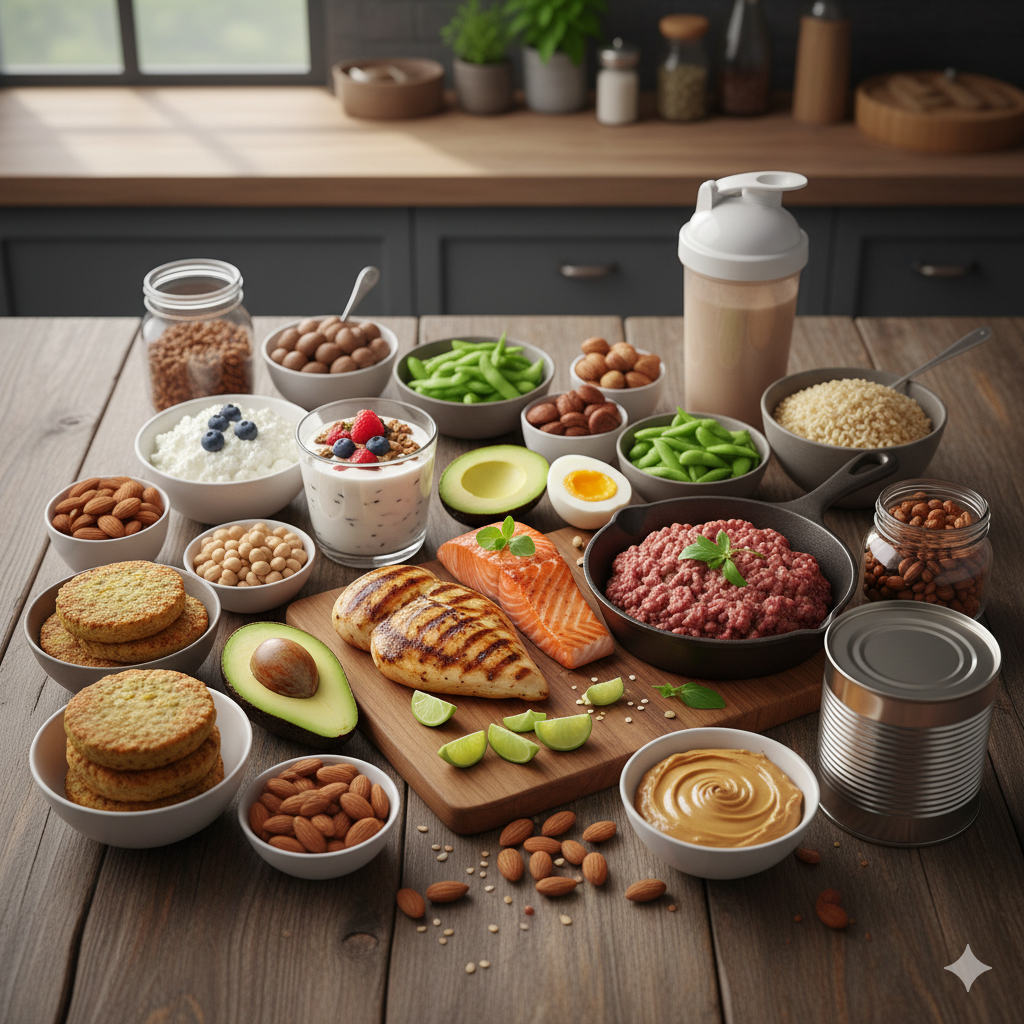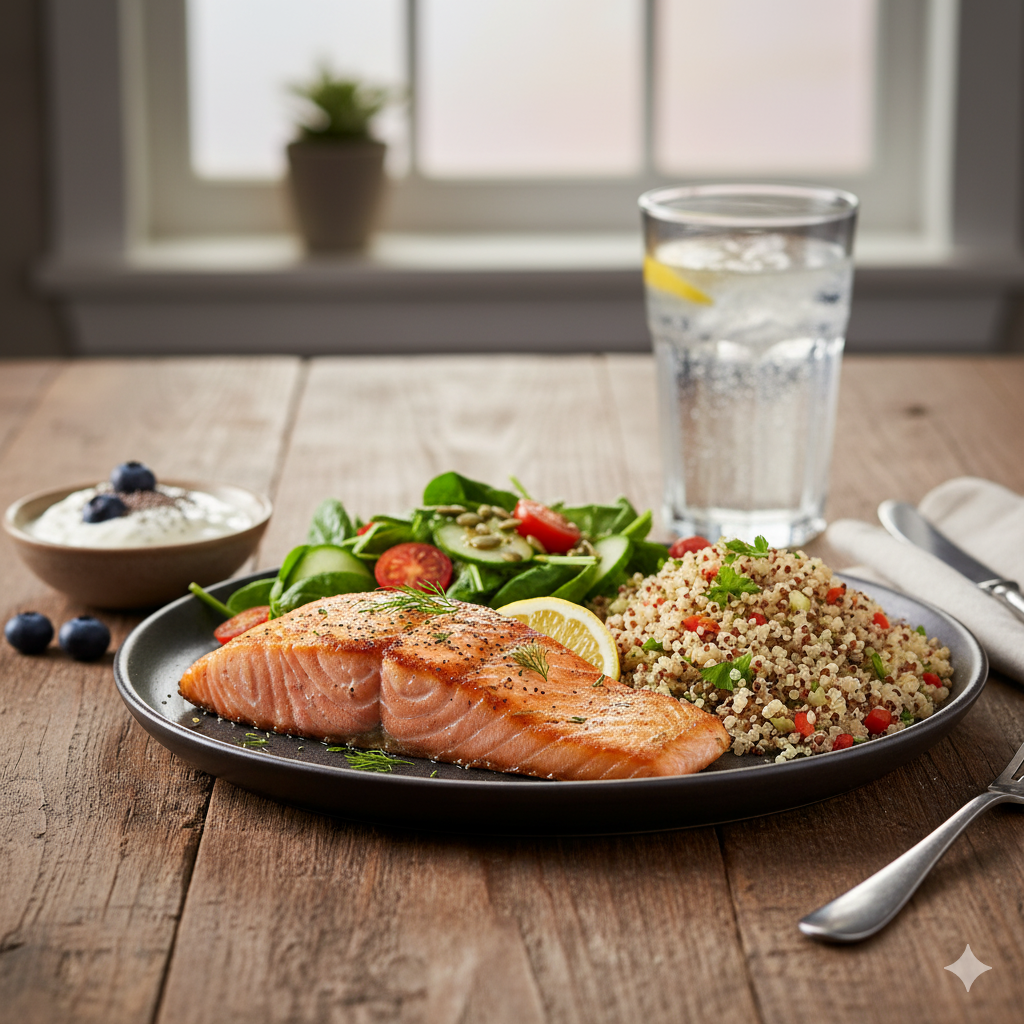In the vast landscape of nutrition, where fads come and go and macronutrients battle for supremacy, one nutrient consistently stands tall, quietly performing its essential duties: protein. Often associated primarily with bodybuilders and athletes, protein’s role extends far beyond muscle growth. It is, in fact, the fundamental building block of life, intricately involved in virtually every cellular process that keeps us alive, vibrant, and thriving.
Imagine your body as a magnificent, bustling city. Carbohydrates are the fuel that powers its vehicles and lights its buildings, and fats are the essential infrastructure for its roads and communication lines. But protein? Protein is the very bricks and mortar, the steel beams, the skilled workers, and the emergency services all rolled into one. Without a consistent and adequate supply of high-quality protein, this city – your body – cannot be built, maintained, defended, or repaired effectively.
This blog post will delve deep into the multifaceted importance of protein, exploring its critical roles in muscle development, weight management, immune function, hormone balance, and overall longevity. We’ll demystify common misconceptions, discuss optimal intake, and empower you with the knowledge to make protein a true cornerstone of your health and wellness journey.
More Than Just Muscle: The Myriad Roles of Protein
While protein’s fame largely stems from its role in muscle building, this is just one piece of a much larger, more intricate puzzle. Proteins are complex macromolecules made up of amino acids, often referred to as the “building blocks” of life. There are 20 different amino acids, nine of which are considered “essential” because your body cannot produce them – you must obtain them through your diet. The way these amino acids are combined and folded determines the specific function of each protein.
Let’s unpack some of protein’s most vital contributions:
1. The Master Builder: Tissue Growth and Repair
Every single cell in your body contains protein. From your hair and nails to your skin, bones, and internal organs, protein is ceaselessly involved in creating new cells and repairing old ones. Whether you’re recovering from a workout, healing a wound, or simply undergoing the natural process of cell turnover, protein is indispensable. This continuous repair and regeneration are what keep your body functioning optimally and resilient to daily wear and tear.
2. Structural Integrity: Holding You Together
Think of collagen, the most abundant protein in your body. It provides strength and elasticity to your skin, tendons, ligaments, and bones. Elastin, another protein, allows tissues like your lungs and arteries to stretch and recoil. Keratin forms the structural basis of your hair and nails. Without these proteins, your body would quite literally lose its shape and integrity.
3. The Catalysts of Life: Enzymes and Hormones
Almost all of the thousands of enzymes that drive biochemical reactions in your body are proteins. These enzymes are like tiny biological machines, speeding up processes from digestion and energy production to detoxification. Hormones, which act as chemical messengers, also often have a protein base (e.g., insulin, growth hormone). They regulate everything from metabolism and growth to mood and reproduction.
4. Your Body’s Defense System: Immune Function
A robust immune system relies heavily on protein. Antibodies, the specialized proteins that identify and neutralize foreign invaders like bacteria and viruses, are a prime example. Without adequate protein intake, your body’s ability to produce these crucial immune cells and molecules is compromised, leaving you more susceptible to illness.
Protein for a Fitter, Healthier You: Weight Management & Satiety
Beyond its foundational roles, protein plays a particularly powerful part in managing your weight and improving body composition. This is where many people experience its tangible benefits directly.
1. The Satiety Factor: Feeling Fuller, Longer
Protein is renowned for its ability to increase satiety – that feeling of fullness and satisfaction after eating. Compared to carbohydrates and fats, protein takes longer to digest, which keeps hunger at bay and reduces the likelihood of overeating or snacking unnecessarily. Incorporating protein into every meal can significantly help in controlling calorie intake naturally.
2. Boosting Metabolism: The Thermic Effect of Food (TEF)
Your body expends energy to digest, absorb, and metabolize the food you eat. This is known as the Thermic Effect of Food (TEF). Protein has a significantly higher TEF than carbohydrates or fats. This means that roughly 20-30% of the calories you consume from protein are used just for its digestion, compared to 5-10% for carbs and 0-3% for fats. This subtle metabolic boost contributes to overall calorie expenditure.
3. Preserving Muscle Mass: Crucial During Weight Loss
When you’re trying to lose weight, especially by reducing calorie intake, there’s a risk of losing not just fat, but also valuable muscle mass. Muscle tissue is metabolically active, meaning it burns more calories at rest than fat tissue. A higher protein intake during a calorie deficit helps to preserve this precious muscle, ensuring that a larger proportion of the weight lost is body fat, not muscle. This maintains a healthier metabolism in the long run.
Here’s an image showcasing various protein sources:
Understanding why protein is important is the first step; knowing how to incorporate it effectively into your diet is the next. The Recommended Dietary Allowance (RDA) for the average sedentary adult is 0.8 grams of protein per kilogram of body weight per day. However, this is considered a minimum to prevent deficiency, not necessarily an optimal amount for thriving health, especially for certain populations.
- Active Individuals & Athletes: If you’re physically active, lift weights, or engage in regular endurance training, your protein needs will be higher, often ranging from 1.2 to 2.2 grams per kilogram of body weight. This increased intake supports muscle repair, growth, and recovery.
- Older Adults: As we age, our bodies become less efficient at utilizing protein for muscle protein synthesis. A higher protein intake (around 1.0 to 1.6 grams per kilogram) is recommended for older adults to combat sarcopenia (age-related muscle loss) and maintain strength and mobility.
- Weight Loss: As mentioned, aiming for higher protein intake (e.g., 1.2 to 1.6 grams per kilogram) during a calorie deficit can significantly aid in preserving muscle mass and enhancing satiety.
Excellent Sources of Protein:
Protein sources can be broadly categorized into animal-based and plant-based, each offering a unique nutritional profile.
Animal-Based Proteins (Complete Proteins): These typically contain all nine essential amino acids.
- Lean Meats: Chicken breast, turkey, lean beef, pork tenderloin.
- Fish and Seafood: Salmon, tuna, cod, shrimp, sardines.
- Eggs: A highly bioavailable and versatile source.
- Dairy: Greek yogurt, cottage cheese, milk, cheese.
Plant-Based Proteins (Often Incomplete, but easily made complete): While many plant sources are “incomplete” (lacking one or more essential amino acids), combining various plant proteins throughout the day (e.g., rice and beans) easily provides all essential amino acids.
- Legumes: Lentils, chickpeas, black beans, kidney beans.
- Soy Products: Tofu, tempeh, edamame.
- Nuts and Seeds: Almonds, walnuts, chia seeds, flax seeds, pumpkin seeds.
- Whole Grains: Quinoa (a complete protein!), oats, brown rice.
- Certain Vegetables: Broccoli, spinach, peas contain moderate amounts of protein.
Aim to spread your protein intake throughout the day rather than consuming it all in one meal. This optimizes muscle protein synthesis and keeps you feeling satisfied. Including a source of protein at breakfast, lunch, and dinner, along with protein-rich snacks, is an effective strategy.
Beyond the Basics: Protein for Long-Term Health
The benefits of adequate protein intake extend far into the realm of long-term health and well-being.
1. Bone Health
Contrary to some older beliefs, a higher protein intake, especially when combined with sufficient calcium and vitamin D, is associated with stronger bones and a reduced risk of osteoporosis. Protein provides the structural matrix upon which bone minerals are laid.
2. Hair, Skin, and Nail Health
As protein forms the structural components of hair, skin, and nails, ensuring sufficient intake can contribute to their strength, elasticity, and overall health. Collagen and keratin are vital for healthy skin and strong nails.
3. Energy Levels and Mood
Stable blood sugar levels, partly regulated by protein’s satiety effect, contribute to sustained energy throughout the day, preventing the crashes associated with high-sugar meals. Furthermore, amino acids are precursors to neurotransmitters like serotonin and dopamine, which play critical roles in mood regulation.
Frequently Asked Questions (FAQs) About Protein
Q1: Can consuming too much protein be harmful?
A: For most healthy adults, consuming a high-protein diet (up to 2 grams per kilogram of body weight) is generally safe. However, excessive protein intake (over 2.5 grams per kilogram) over a long period can potentially place a strain on the kidneys, especially in individuals who have pre-existing kidney conditions. It is essential to drink plenty of water to help the kidneys process the waste products. Always consult a doctor or dietitian if you have concerns about your kidney health before drastically increasing your protein intake.
Q2: What are “complete” versus “incomplete” proteins?
A:Complete Proteins contain all nine essential amino acids (the ones your body cannot produce on its own) in sufficient amounts. Most animal sources (meat, eggs, dairy, fish) are complete proteins.
- Incomplete Proteins are missing or very low in one or more of the essential amino acids. Most plant sources (beans, grains, nuts) are incomplete.
- The key takeaway: Vegetarians and vegans can easily get all essential amino acids by consuming a variety of plant proteins throughout the day (e.g., combining rice and beans or hummus and pita bread).
Q3: When is the best time to eat protein for muscle growth?
A: While the idea of an immediate “anabolic window” post-workout has been refined, consuming protein within a couple of hours after resistance training is beneficial for muscle repair and growth (muscle protein synthesis). However, consistently spreading your protein intake throughout the day (aiming for 20-40 grams per major meal) is generally more important than the exact timing immediately after exercise.
Q4: Are protein supplements necessary?
A: For most individuals, no. You can easily meet your daily protein needs through whole foods (lean meat, poultry, fish, eggs, dairy, legumes, and nuts). Protein supplements (like whey or plant-based powders) are primarily useful for:
- Athletes or very active people with high protein requirements that are difficult to meet through food alone.
- Individuals with limited appetite or who need a quick, convenient source of protein.
- People who are trying to manage weight and need a high-satiety, low-calorie option.
Q5: Does protein give you energy?
A: Yes, protein can be used as an energy source, supplying 4 calories per gram, the same as carbohydrates. However, your body prefers to use carbohydrates and fats for primary energy. Protein’s main function is structural and metabolic. It is typically only converted to energy when carbohydrate and fat stores are insufficient.
Check out our more blogs:


